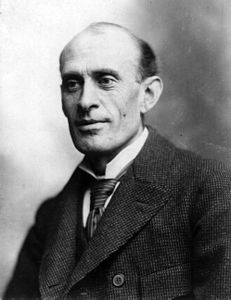Analysis of Lydia Dick
Eugene Field 1850 (St. Louis) – 1895 (Chicago)
When I was a boy at college,
Filling up with classic knowledge,
Frequently I wondered why
Old Professor Demas Bently
Used to praise so eloquently
'Opera Horatii.'
Toiling on a season longer
Till my reasoning power got stronger,
As my observation grew,
I became convinced that mellow,
Massic-loving poet fellow
Horace knew a thing or two
Yes, we sophomores figured duly
That, if we appraised him truly,
Horace must have been a brick;
And no wonder that with ranting
Rhymes he went a-gallivanting
Round with sprightly Lydia Dick!
For that pink of female gender
Tall and shapely was, and slender,
Plump of neck and bust and arms;
While the raiment that invested
Her so jealously suggested
Certain more potential charms.
Those dark eyes of her that fired him--
Those sweet accents that inspired him,
And her crown of glorious hair--
These things baffle my description;
I should have a fit conniption
If I tried--so I forbear!
May be Lydia had her betters;
Anyway, this man of letters
Took that charmer as his pick;
Glad--yes, glad I am to know it!
I, a fin de siecle poet,
Sympathize with Lydia Dick!
Often in my arbor shady
I fall thinking of that lady
And the pranks she used to play;
And I'm cheered--for all we sages
Joy when from those distant ages
Lydia dances down our way.
Otherwise some folks might wonder
With good reason why in thunder
Learned professors, dry and prim,
Find such solace in the giddy
Pranks that Horace played with Liddy
Or that Liddy played on him.
Still this world of ours rejoices
In those ancient singing voices,
And our hearts beat high and quick,
To the cadence of old Tiber
Murmuring praise of roistering Liber
And of charming Lydia Dick.
Still, Digentia, downward flowing,
Prattleth to the roses blowing
By the dark, deserted grot;
Still, Soracte, looming lonely,
Watcheth for the coming only
Of a ghost that cometh not.
| Scheme | XXXAAB CCDEED AAFGFF CCHBBH IIXJJC KKFBBF AALXML CCIAAI HMFCCF GGBAAB |
|---|---|
| Poetic Form | Etheree (32%) |
| Metre | 11101110 10111010 1001101 10101010 11111000 101 10101010 1110010110 110101 10101110 1101010 1010111 1111010 11101110 1011101 01101110 11101 11101001 1111110 10101010 1110101 1011010 01100010 1010101 111101101 111010101 00111001 11101010 11101010 111111 111001010 1011110 1110111 11111111 10111010 1011001 10011010 11101110 0011111 01111110 11111010 100101101 1011110 11101010 1010101 11100010 11101110 1110111 1111101 01101010 01011101 10101110 1001111 01101001 111010 1101010 1010101 111010 1101010 1011101 |
| Closest metre | Iambic tetrameter |
| Characters | 1,800 |
| Words | 325 |
| Sentences | 11 |
| Stanzas | 10 |
| Stanza Lengths | 6, 6, 6, 6, 6, 6, 6, 6, 6, 6 |
| Lines Amount | 60 |
| Letters per line (avg) | 25 |
| Words per line (avg) | 5 |
| Letters per stanza (avg) | 147 |
| Words per stanza (avg) | 32 |
Font size:
Submitted on May 13, 2011
Modified on March 05, 2023
- 1:37 min read
- 61 Views
Citation
Use the citation below to add this poem analysis to your bibliography:
Style:MLAChicagoAPA
"Lydia Dick" Poetry.com. STANDS4 LLC, 2024. Web. 30 Apr. 2024. <https://www.poetry.com/poem-analysis/13003/lydia-dick>.


Discuss this Eugene Field poem analysis with the community:
Report Comment
We're doing our best to make sure our content is useful, accurate and safe.
If by any chance you spot an inappropriate comment while navigating through our website please use this form to let us know, and we'll take care of it shortly.
Attachment
You need to be logged in to favorite.
Log In